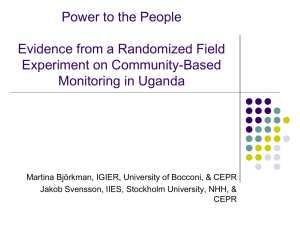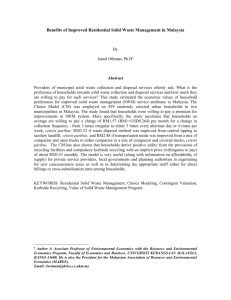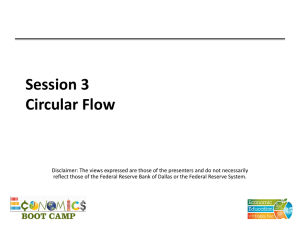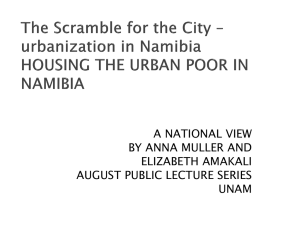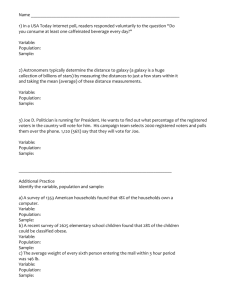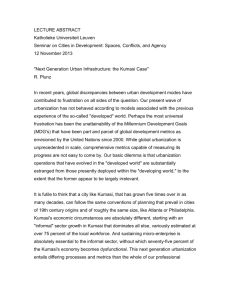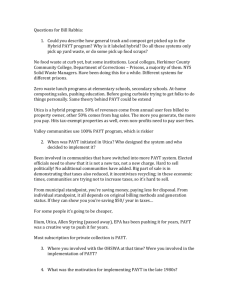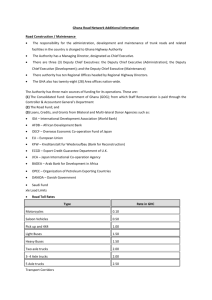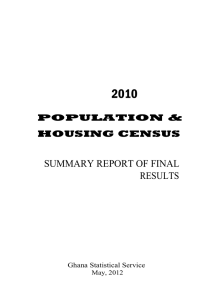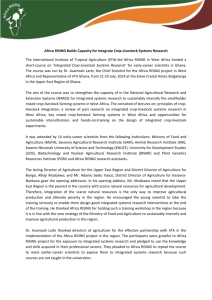Abstract
advertisement
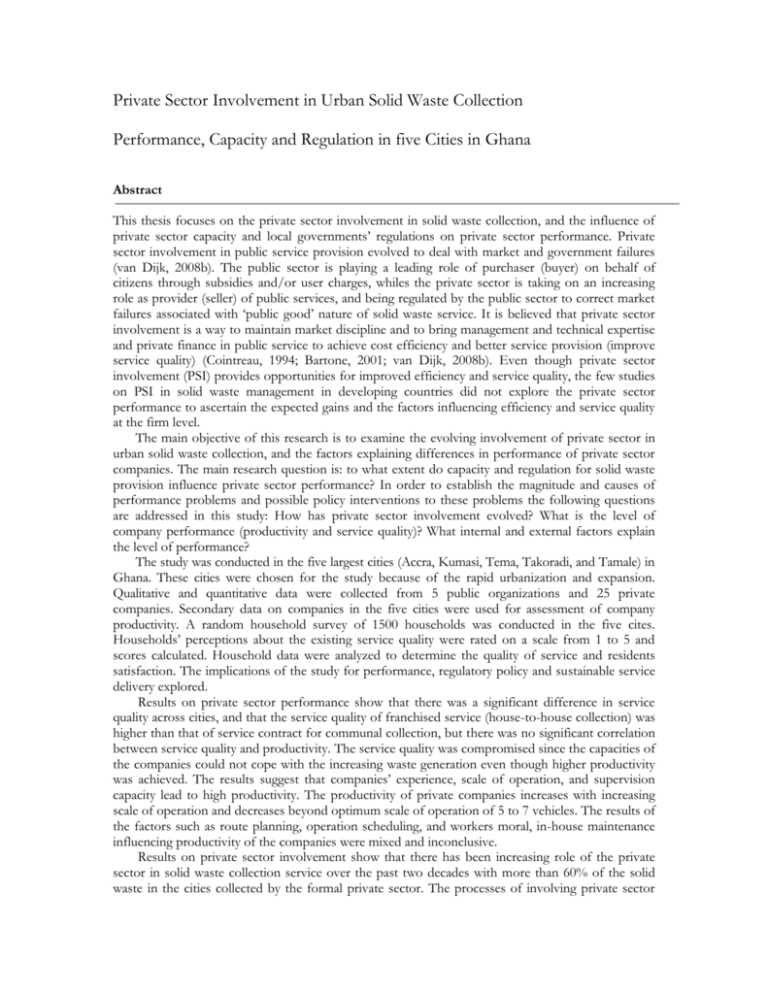
Private Sector Involvement in Urban Solid Waste Collection Performance, Capacity and Regulation in five Cities in Ghana Abstract This thesis focuses on the private sector involvement in solid waste collection, and the influence of private sector capacity and local governments’ regulations on private sector performance. Private sector involvement in public service provision evolved to deal with market and government failures (van Dijk, 2008b). The public sector is playing a leading role of purchaser (buyer) on behalf of citizens through subsidies and/or user charges, whiles the private sector is taking on an increasing role as provider (seller) of public services, and being regulated by the public sector to correct market failures associated with ‘public good’ nature of solid waste service. It is believed that private sector involvement is a way to maintain market discipline and to bring management and technical expertise and private finance in public service to achieve cost efficiency and better service provision (improve service quality) (Cointreau, 1994; Bartone, 2001; van Dijk, 2008b). Even though private sector involvement (PSI) provides opportunities for improved efficiency and service quality, the few studies on PSI in solid waste management in developing countries did not explore the private sector performance to ascertain the expected gains and the factors influencing efficiency and service quality at the firm level. The main objective of this research is to examine the evolving involvement of private sector in urban solid waste collection, and the factors explaining differences in performance of private sector companies. The main research question is: to what extent do capacity and regulation for solid waste provision influence private sector performance? In order to establish the magnitude and causes of performance problems and possible policy interventions to these problems the following questions are addressed in this study: How has private sector involvement evolved? What is the level of company performance (productivity and service quality)? What internal and external factors explain the level of performance? The study was conducted in the five largest cities (Accra, Kumasi, Tema, Takoradi, and Tamale) in Ghana. These cities were chosen for the study because of the rapid urbanization and expansion. Qualitative and quantitative data were collected from 5 public organizations and 25 private companies. Secondary data on companies in the five cities were used for assessment of company productivity. A random household survey of 1500 households was conducted in the five cites. Households’ perceptions about the existing service quality were rated on a scale from 1 to 5 and scores calculated. Household data were analyzed to determine the quality of service and residents satisfaction. The implications of the study for performance, regulatory policy and sustainable service delivery explored. Results on private sector performance show that there was a significant difference in service quality across cities, and that the service quality of franchised service (house-to-house collection) was higher than that of service contract for communal collection, but there was no significant correlation between service quality and productivity. The service quality was compromised since the capacities of the companies could not cope with the increasing waste generation even though higher productivity was achieved. The results suggest that companies’ experience, scale of operation, and supervision capacity lead to high productivity. The productivity of private companies increases with increasing scale of operation and decreases beyond optimum scale of operation of 5 to 7 vehicles. The results of the factors such as route planning, operation scheduling, and workers moral, in-house maintenance influencing productivity of the companies were mixed and inconclusive. Results on private sector involvement show that there has been increasing role of the private sector in solid waste collection service over the past two decades with more than 60% of the solid waste in the cities collected by the formal private sector. The processes of involving private sector have been delineation of city into zones, engagement through competitive bidding or no bidding, and rendering of service with or without signed contractual agreements between companies and Local Governments. Notwithstanding the increasing involvement of private sector, the involvement of households to pay for service provision, monitor service quality and source separate waste has been slow. Most of the people are aware of preventive measures to deal with illegal dumping and solid waste problems. The Local Governments and companies have not ensured customer-oriented service due to the slow pace of user charging and low cost recovery. However, there is a gradual well functioning system being put in place with the recent competitive bidding, signing of contracts, and city-wide user charging. A shift towards cost recovery through charging all households on pay-asyou-throw (PAYT) basis for communal service and monthly fixed charges for kerbside collection (house-to-house) started first in Tema and recently in Kumasi and Accra. The PAYT approach with potential for full cost recovery was used in Kumasi for the low income communities whereas in Accra monthly service fee was imposed on low income households. The fee-based collection in Accra are faced with problems of financing bins, unwillingness of households to register for collection, low payment rate by low income householders, illegal dumping by some households who refused to register, high disposal fee, and weak enforcement of registration by the Assembly. There were weak regulatory practices and non-adherence to contractual obligations, and consequently provided no incentives for full cost recovery and better service quality, but now a gradual well functioning system is being put in place. The regulatory practices and ‘capture’ which affected service quality are unsigned contract, prolonged period before upward review of collection fees and service charges, delay payment of subsidy and no interest on money delayed. The delay in subsidy payment (for more than a year) to the private companies does not provide incentive for private sector growth and does not enhance better service delivery. Results suggest that ‘regulatory capture’ exist in contracting since some companies had contracts signed and receive regular payments whereas others did not. There were weak adherence to obligations such as sanctioning of private companies for non-compliance and enforcement of by-laws. The weak enforcement of legislation does not provide incentives for better service quality and full coverage. Regulation of prices by the Local Government where service charges and collection fees are not sufficient to cover full cost of service, where investment in new collection vehicles is recovered, undermine the service quality of the companies. A major constraint of solid waste management was the inadequate capacity and financial resources of the Assemblies and regulatory capture by politicians. The conclusions drawn from the study are that: (1) there was no significant correlation between service quality and productivity, but there exist significant difference in service quality across cities, and that the service quality of house-to-house collection was higher than that of communal collection, (2) the analysis of the evolving involvement of the private sector show that there was zoning of the cities into solid waste collection zones and increasing role of the private sector in solid waste collection service over the past two decade with each company operating in a defined collection zone, (3) despite the increasing involvement of private sector, the involvement of households in paying for service provision, monitoring of service quality, and waste recycle and recovery has been slow, (4) a shift towards cost recovery, through city-wide-fee-based solid waste collection, to charge all households on pay-as-you-throw (PAYT) basis for communal service and monthly flat charges for kerbside collection has potential for better service quality, (5) there were weak regulatory practices and non-adherence to contractual obligations, and consequently provided little incentives for cost recovery and better service quality, (6) the findings suggest that companies’ experience, scale of operation, and supervision capacity lead to high productivity, (7) the major constraints of solid waste management were the inadequate capacity and resources of the Local Governments (Assemblies), over age collection vehicles, low cost recovery, long delay in paying for the contracts, inadequate monitoring of quality of service, and regulatory capture by politicians. This study concludes that the solutions to the problem of solid waste management hinge on adherence to formal rules, use of appropriate cost recovery mechanism for low income group, and restructuring of institutional arrangement to enforce legislation and build capacity.

